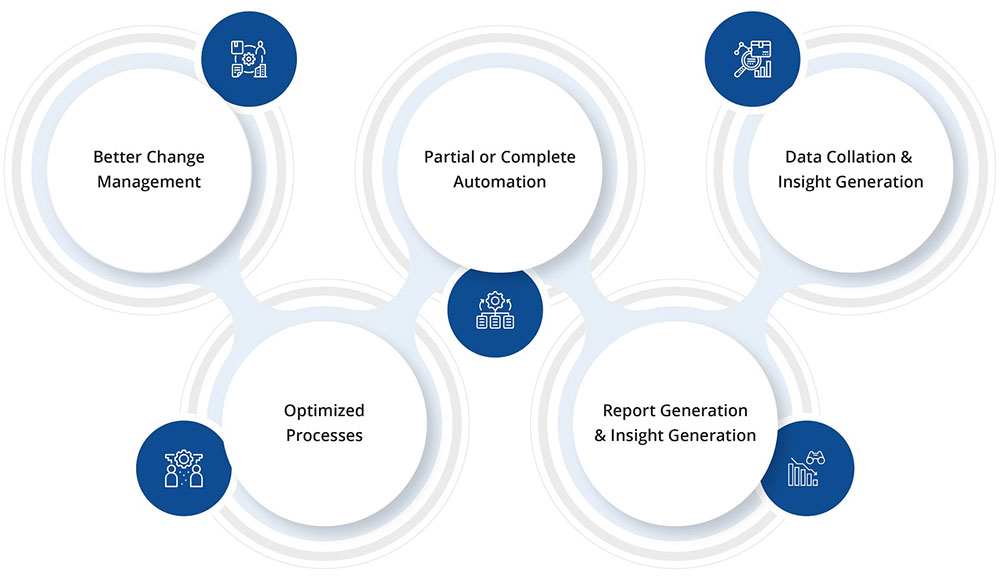- In the biotechnology and life sciences industry, the product’s end quality depends on the product lifecycle management process. It is essential to optimize and streamline these processes while making automation an irreplaceable component.
- Apart from the need to expedite adaption of modern-day technology across the board, the biotech industry also evaluates tools that ranks high on ROI.
- The ongoing Covid-19 pandemic has put the biotech industry at the front and center in terms of the need for faster tests and development of a vaccine and/ or therapeutics. This unprecedented set of events has brought forward even more pressing challenges in biotechnology manufacturing.
The biotech industry is synonymous with cutting-edge research for drugs, better health products, and more. This means the industry needs to evaluate itself for its technological quotient continually. The evaluation will also enable biotech and life sciences companies to know their exact challenges and pain areas. If we look at recent times (past decade), one of the prominent areas that require companies and researchers’ attention is biotechnology manufacturing. While the industry itself is projected to thrive, it is not devoid of some pressing issues that need to be addressed with robust IT reframing.
The global biotechnology industry growth is estimated to reach $727.1 billion by 2025, and at a CAGR of 7.4%.
These numbers are both exciting and intimidating. Now is the time for the biotechnology sector to invest in fortifying their IT infrastructure to overcome their challenges and stand tall in the coming era of growth in demand.
Let us dive deep into the biotech sector’s five major problems in biotechnology and discuss technologies, tools, and systems to enable manufacturers to overcome these issues.
1.Challenges Pertaining to Funding/ Investments:Yes, the challenges faced by the biotechnology industry begin even before scientists step inside the lab! Venture capitalists are highly cautious in investing in biotech firms. Part of the reason is that the biotech/ life sciences/ pharmaceutical industries are slow-moving industries tied with many regulations. There is a fine line between drug/process acceptance and rejection. Another challenge in this area is the lack of a proper channel that can facilitate precise tracking of funds and generate insightful reports to make investors aware of the money spent. Lack of analytical insights also means that the current or potential investors do not get future predictions, which are readily available in other industries such as software and automobile.
How can Technology Answer These Challenges?Biotechnology companies should look into comprehensive Enterprise Resource Planning (ERP) systems that will enable them to track expenses and tie them back to their funding. An advanced ERP system equipped with advanced analytics features can help leverage data to generate insightful predictions and statistics.
2.Lack of Skillset:Across the board, there is a drying of talent pool for biotech experts who are adept in core subjects and technological applications. This creates a hindrance in quality production. Companies often struggle to keep their employees up-to-date with the latest happenings in the biotech industry. Personnel on the ground are not always aware of the industry trends as they are busy moving the day-to-day processes forward. Also, arranging skill upgrade training is a costly and time-consuming affair. However, the skill gap is a significant issue. Experts stress the perils of obsolete skillset and the importance of recruiting and retaining a highly-skilled workforce in biotech companies.
What Technological Solutions help Overcome Skill Gap?First off, it is crucial to choose agile, easy to use, simple to onboard applications to run everyday operations without losing the ability to capture the power of data. You don’t want to compromise the system in the effort of keeping it simple. Secondly, there are various learning and development platforms available that include individual training tools for employees. The ideal ones are embedded into the ERP system that behaves as a task recording guide. These automated platforms enable ease of access and ensure training completion without the need for individualized supervision.
3.Disconnect with Customer Expectation and Lack of Market Reading:Like any other industry, the biotech industry also faces challenges if there is a disconnect with its customers. Many companies also rely on conventional methods to read the market and gauge demands. Often there is a disconnect in the market demands vs. the in-house standards. However, this type of disconnect leads to poor customer satisfaction and misplaced product placements.
What Role Does Software Play in Establishing Better Customer Relations?A newer, more advanced AI-based customer relationship management (CRM) system tied to an operations system or ERP system can enable biotech firms to enhance their customer outreach and expedite response time. Moreover, CRM is also used to make better market predictions through thorough data analysis and trend studies.
4.Non-streamlined Supply Chains:A companies’ output is only as strong as its input – primarily people, process and software. This is also true in the case of maintaining a robust supply chain network. The Covid-19 pandemic saw disrupted supply chains because of grounded airlines and travel restrictions across various countries globally. There was also a major shift in demand of raw material, resulting in chain reaction of changes across supply chains. Such events need an agile, streamlined and optimized supply chain wherein different departments work in tandem and information is cascaded in real-time.
FIGURE 1:Leveraging the power of Data Science in Biotech

How can Biotech Companies Make Use of the Latest Technologies to streamline supply chain?The answer is an agile cloud-based ERP platform that includes the following feature set –
- proactive planning and tracking workforce hours to a project.
- providing supply-demand signals while procuring raw material and shipping samples.
- process automation and approval workflows.
- embedded training portals.
- increased process visibility and data management.
- real-time collaboration across various suppliers.
A robust application helps in better inventory management, communication and an overall optimized supply chain that can respond well to changes. The primary emphasis should be on moving towards newer systems and gradually letting go of legacy software. This will help the biotech industry leverage the full benefit of Industry 4.0 and make the most of its potential.
Key Takeaways:
- Biotech companies need to rethink operations as a technology-powered ecosystem to expedite their process and ensure products are ready for quicker commercialization.
- Modern-day AI-based ERP, SCM and CRM systems are crucial in enabling the biotech sector to become agile and more responsive.
Get Free Consultation For all Your Business Needs







